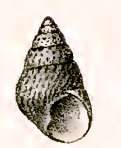Phasianotrochus rutilus
Phasianotrochus rutilus, common name the pink-tipped kelp shell, is a species of sea snail, a marine gastropod mollusk in the family Trochidae, the top snails.[2][3]
| Phasianotrochus rutilus | |
|---|---|
 | |
| Drawing of a shell of Phasianotrochus rutilus | |
| Scientific classification | |
| Kingdom: | Animalia |
| Phylum: | Mollusca |
| Class: | Gastropoda |
| Clade: | Vetigastropoda |
| Order: | Trochida |
| Superfamily: | Trochoidea |
| Family: | Trochidae |
| Genus: | Phasianotrochus |
| Species: | P. rutilus |
| Binomial name | |
| Phasianotrochus rutilus | |
| Synonyms | |
| |
Description
The height of the shell varies between 10 mm and 15 mm. The solid, imperforate shell has a conical shape. It is shining, fawn-colored or light yellowish-olive, with numerous narrow oblique flexuous reddish longitudinal lines. The upper whorls of the spire are more or less marked with white and pink or olive spots arranged spirally. The conic spire is straight sided. The acute apex is white or buf. The sutures are linear, becoming a trifle impressed around the body whorl. The about 7 whorls are planulate, densely spirally striate, the striae stronger on the base. The penultimate whorl is a trifle projecting above the suture. The body whorl is obtusely subangular at the periphery. The aperture is triangular-ovate. The outer lip is arcuate above, green-marginate just within the edge. This rim is followed by a band of opaque white which is deposited thi. It is not more than I2 mm broad, and does not extend to the upper angle of aperture. Within this the aperture is very brilliantly iridescent and green. The pearly columella is vertical, ending in an acute, compressed denticle. The parietal wall has a thin deposit of brilliantly iridescent Prussian blue nacre.[4]
Distribution
This marine species is endemic to Australia and occurs in the subtidal zone off South Australia, Tasmania and Victoria.
References
- Adams, A. 1853. Contributions towards a monograph of the Trochidae, a family of gastropodous Mollusca. Proceedings of the Zoological Society of London 1851(19): 150-192
- Bouchet, P. (2012). Phasianotrochus rutilus (A. Adams, 1851). Accessed through: World Register of Marine Species at http://www.marinespecies.org/aphia.php?p=taxdetails&id=573225 on 2012-11-23
- Hickman C.S. (2005) Seagrass fauna of the temperate southern coast of Australia I: The cantharidine trochid gastropods. In: F.E. Wells, D.I. Walker & G.A. Kendrick (eds), The marine flora and fauna of Esperance, Western Australia: 199-220. Western Australian Museum, Perth.
- Tryon (1889), Manual of Conchology XI, Academy of Natural Sciences, Philadelphia
- Gatliff, J.H. & Gabriel, C.J. 1914. Additions to the Catalogue of the Marine Shells of Victoria. Proceedings of the Royal Society of Victoria n.s. 27(1): 99-103
- Macpherson, J.H. & Gabriel, C.J. 1962. Marine Molluscs of Victoria. Melbourne : Melbourne University Press & National Museum of Victoria 475 pp.
- Ludbrook, N.H. 1978. Quaternary molluscs of the western part of the Eucla Basin. Bulletin of the Geological Survey of Western Australia 125: 1-286
- Wilson, B. 1993. Australian Marine Shells. Prosobranch Gastropods. Kallaroo, Western Australia : Odyssey Publishing Vol. 1 408 pp.
External links
- To Biodiversity Heritage Library (2 publications)
- To World Register of Marine Species
- "Phasianotrochus rutilus". Gastropods.com. Retrieved 16 January 2019.